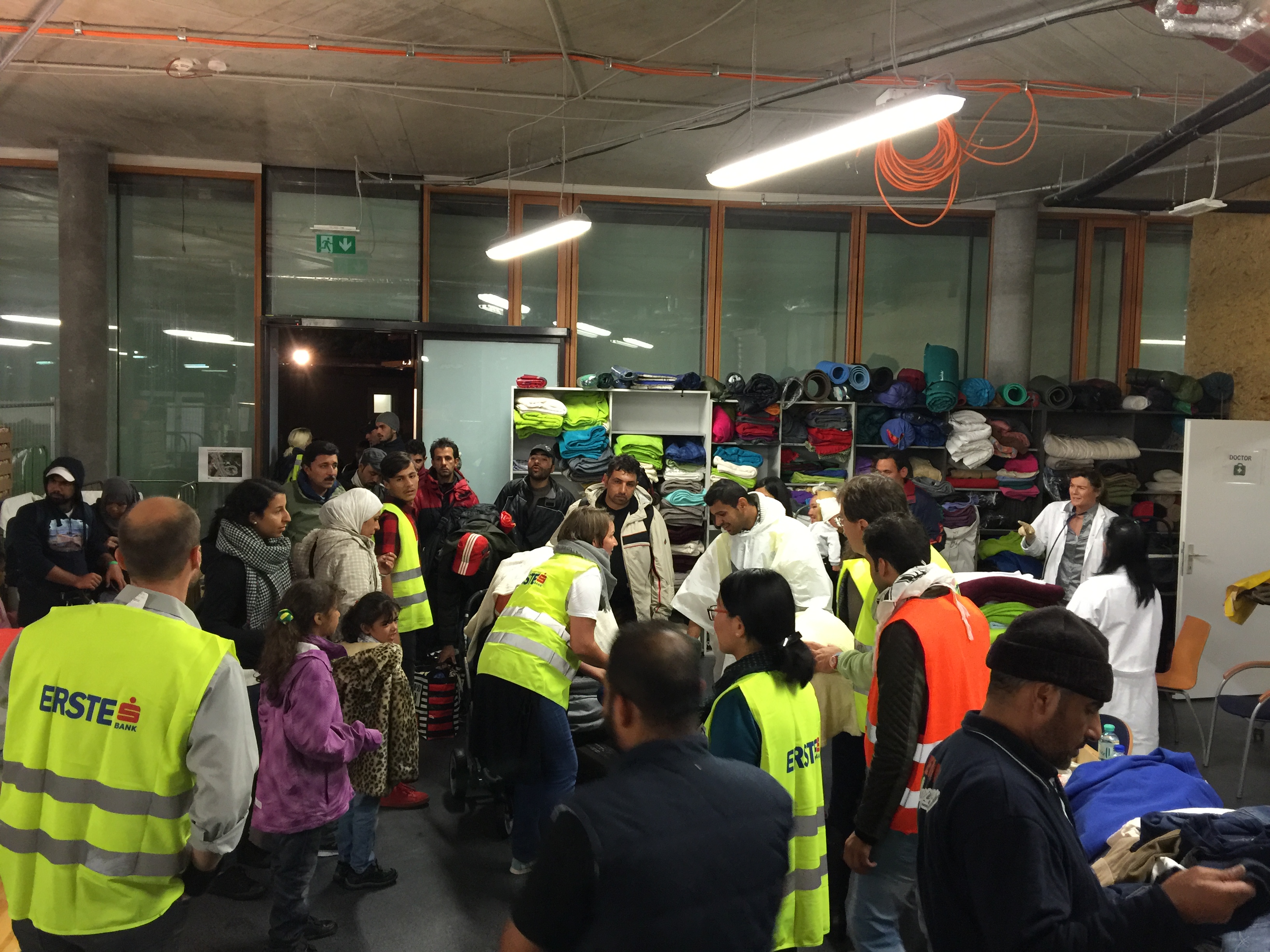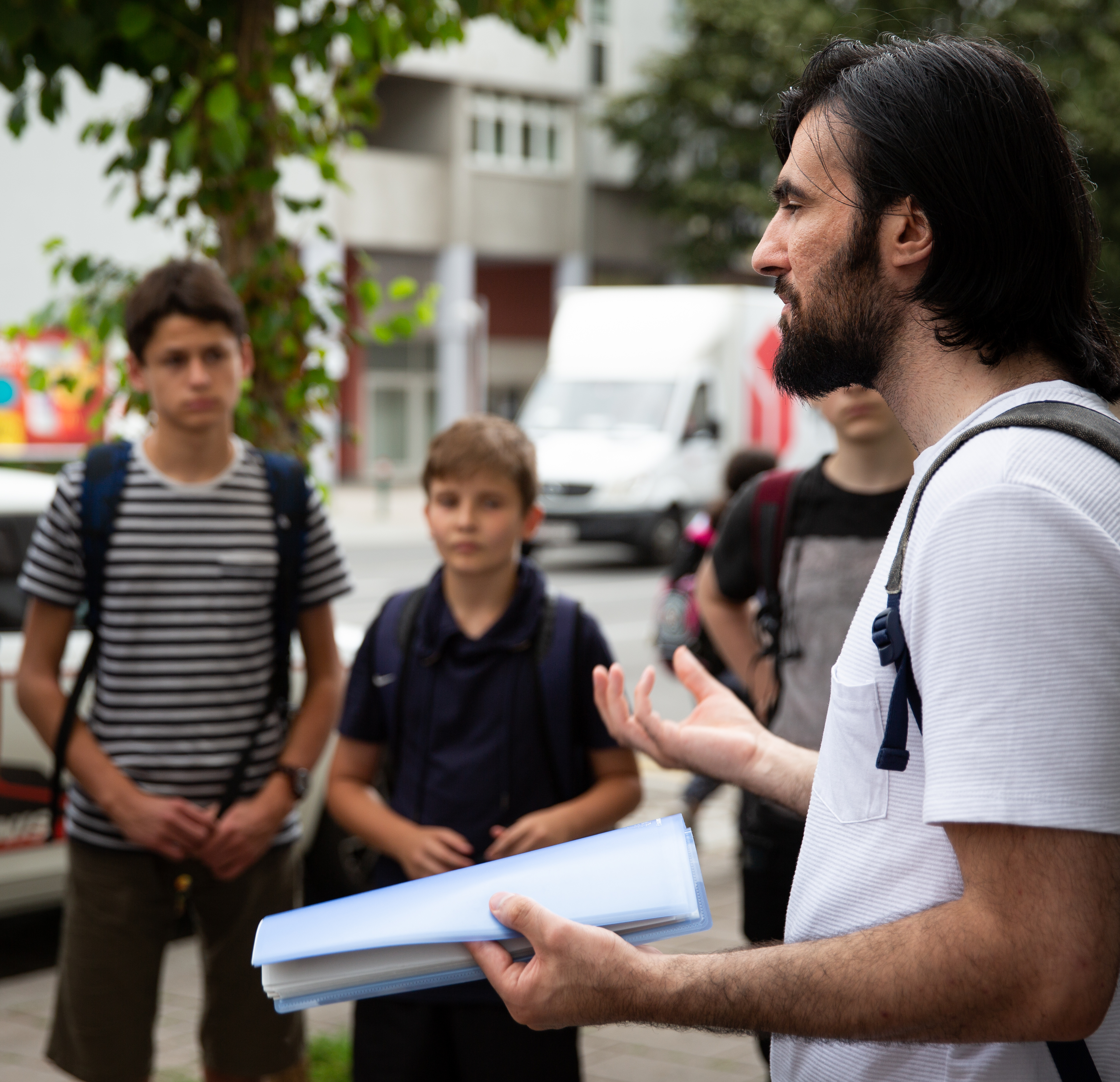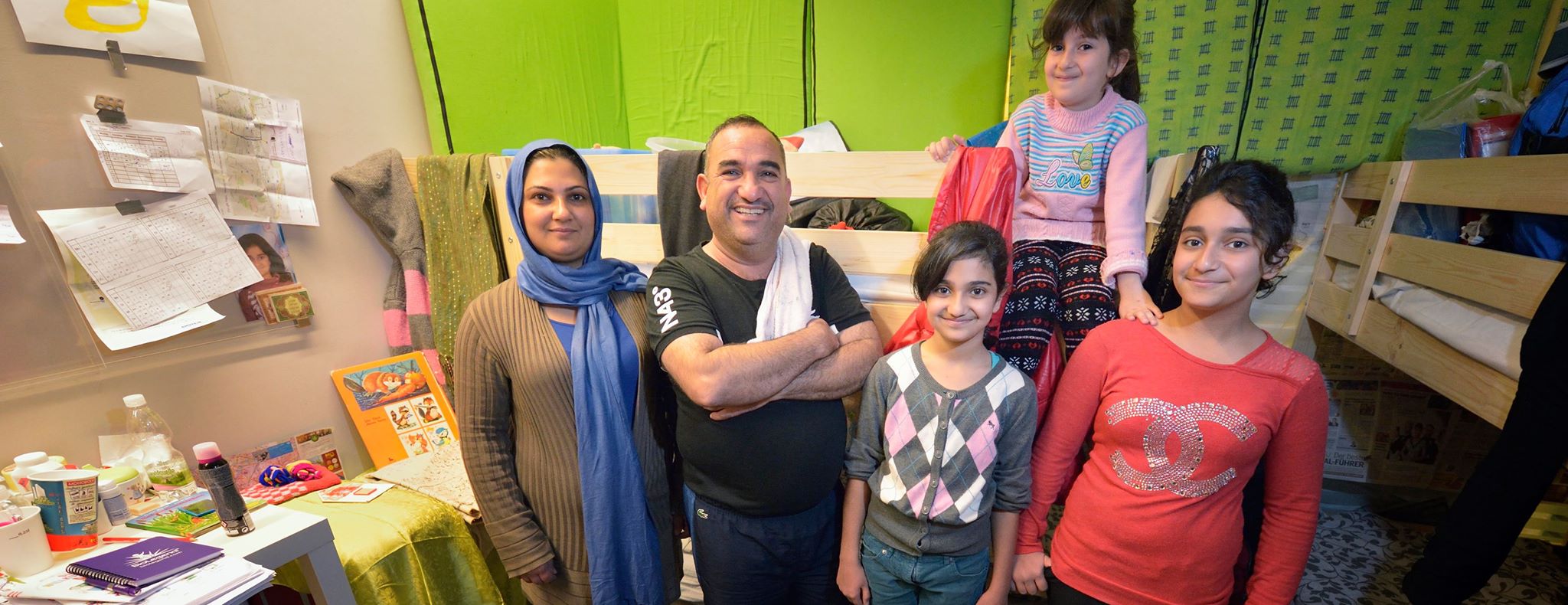From mid-September to December 2015, some 14,827 refugees spent their nights at Erste Campus, looked after by volunteers from Erste Bank and ERSTE Foundation. SHADES TOURS has now provided an opportunity for them to meet again.
A total of 1,500 kg of bananas, 20,000 bottles of mineral water and more than 60,000 hygiene products were handed out to refugees back then. Today there are no reminders of those days. Rows of books fill the high shelves. The foundation’s library has moved into the ground floor of the building at Erste Campus, where life is back to normal.

New arrivals receive essentials at the night shelter. Some 600,000 refugees passed through Austria in 2015. Nearly 15,000 of them stayed overnight at the ERSTE Foundation shelter between September and December of that year. Photo: © Dejan Petrović
In the late summer and autumn of 2015, a large number of people arrived at Vienna’s railway stations within a very short period of time. Erste Campus is adjacent to the central station, and the offices of ERSTE Foundation were not yet occupied. It only took adapting these spaces and providing supplies for the arrivals. “There was no discussion. It was clear to everyone that we are going to do this. I was surprised, no, really excited about how quickly we as an organization adjusted and worked together”, says Andreas Treichl, CEO of Erste Group, in retrospect.
In the early days of autumn 2015, up to 240 people found overnight shelter in these spaces. Numerous employees from Erste Bank and ERSTE Foundation attended to nearly 15,000 refugees who had arrived at the central station. They supplied them with beds, fed the hungry ones, provided those who were freezing with clothes and blankets, and ensured they received medical counselling and care.
“It’s one thing to talk about refugees in theory; it’s quite another to unlock the doors and welcome these people in. That’s a very emotional moment”.
Chicken, fish & beef
The following foodstuffs were distributed to nearly 15,000 refugees over the course of three months:
30,000 tea bags – With an average weight of 0.75 g per tea bag, this adds up to 52,5kg that were used to brew tea. In addition, 20,000 bottles of mineral water and 1,000 litres of milk were distributed.
1,500 kg of bread – Bread ranked first among basic foodstuffs, followed by 600 kg of cheese, 200 kg of cucumbers and 200 kg of tomatoes.
375 kg of cereal bars and chocolate – Sugar and food containing sugar were much sought after, probably because they quickly provide energy. In addition to the 15,000 cereal and chocolate bars, 1,500 kg of bananas were distributed, which corresponds to around 13,500 individual bananas, and 1,000 kg of sugar was consumed.
Chicken, fish & beef: In order to prevent misunderstandings, pictures were sometimes used to help. Photo: © Dejan Petrović
It all began on 5 September 2015, when the former Erste Bank branch office at Europaplatz near Westbahnhof (Vienna West station) was promptly opened to 70 people seeking protection. Only a week later, growing demand made it necessary to look for further accommodation close to the central railway station. The future offices of ERSTE Foundation seemed to be a good choice, as they were vacant at the time and their adaptation was still in the planning stages.
“I wouldn’t have believed what we were capable of,” says Renate Tomaschek, head of Facility Management at Erste. She and her colleagues Andrea Besenhofer, David Krieber, Gerhard Ruprecht (executive board of Zweite Sparkasse) and Svegy Duman (Erste Bank refugee coordination) promptly took the initiative, taking charge of the events of those days. Within a few hours they arranged for the construction of 120 bunk beds, the installation of sanitary facilities, and the provision of medical care. Food, blankets and clothes were hauled in. Hundreds of volunteers from Erste Bank, ERSTE Foundation, Arbeitersamariterbund, the Johanniter and Train of Hope initiative provided for everything else.
“It’s one thing to talk about refugees in theory; it’s quite another to unlock the doors and welcome these people in. That’s a very emotional moment. You’re suddenly faced with people’s fates,” says Renate Tomaschek recalling those days. Each day at 7 p.m. she would open the doors to the night shelter, after Train of Hope members had counted off 240 bracelets at the central station, distributed them to those arriving, and taken them to the ERSTE Foundation premises. Families with children came first, followed by women travelling alone, and finally men travelling alone. It was vital not to separate families, whereas different nationalities were accommodated separately in most cases.
Zakarya, one of 600,000 refugees, today guides people through “his” Vienna
According to estimates by the UN Refugee Agency UNHCR, more than 800,000 people seeking refuge fled to Europe by land and sea in 2015. Some 600,000 of them passed through Austria. Between 90,000 and 95,000 asylum applications were lodged in Austria, more than 20,800 in the months of September and October alone. Rarely had there ever been so many people on the run. And rarely had there ever been so much empathy and solidarity for those who had nearly lost everything.
Zakarya was one of them. Today he is sitting in the head office of SHADES TOURS recounting his months-long journey from Syria through Greece to Austria. He talks about crossing the sea by boat to the island of Lesbos and how they passed through rivers and swamps in small groups cheering each other up along the way. But he also talks about his motives for embarking on this journey: He didn’t want to serve in the armed forces. He didn’t want to kill people.
A tall man with a dark beard who left Damascus three years ago for Vienna, Zakarya now works for SHADES TOURS, guiding pupils, interested individuals and groups through his adopted home town. What makes the tours so special for him is the opportunity to speak with people individually. He loves to give a face to those in the shadow of war and persecution, to show the people behind the numbers. The topics of the refugee-led tours range from arriving in Austria, to their first impressions at railway stations, to finding a place in society. Because “temporary shelter is not enough,” says Zakarya.

Vienna seen through the eyes of a refugee: Zakarya Ibrahem from SHADES TOURS guides pupils through “his” Vienna. Photo: © SHADES TOURS
The route, specially developed for these thematic tours, leads from the campus at the central railway station via the Austrian Federal Office for Immigration and Asylum, the Wohndrehscheibe (organisation assisting low-income people in search of private housing) operated by Volkshilfe and Rochusmarkt, to the Austrian Integration Fund and the Wien Mitte railway station. Along the way, Zakarya and his three colleagues share not only their own individual stories of fleeing but those of an entire generation. They speak about the overnight shelters at Erste Campus and Europaplatz and share interesting facts about refugees and asylum seekers, and about finding accommodation and work and learning the language in Austria. “I always start my tours close to Erste Campus,” says Zakarya. Because this is where the refugees first arrived and where the Train of Hope staff gave them over to the care of Erste Bank employees. This is where many started a second life.
Perrine Schober, founder and managing director of SHADES TOURS, launched her initiative in 2015. The first socio-political city tours were led by homeless people who explained Vienna’s welfare system with regard to the city’s homeless assistance service. “In response to the new needs arising from the so-called refugee crisis, we have extended our programme to include tours on asylum-seeking and integration,” she says. SHADES TOURS aims to raise awareness of and facilitate encounters with “marginalised groups” in order to overcome prejudice, shed light on the complexity of socio-political issues and find ways to (re)integrate affected persons in the long term.

What started off with 70 beds eventually became a space providing 200 people with a place to sleep. Between September 2015 and March 2016 women and families preferentially were offered temporary shelter at the Erste Bank branch office at Europaplatz for an average period of 4-6 weeks. Photo: © David Krieber
What will remain of autumn 2015?
As one of the most important financial services providers in Central and Eastern Europe, Erste Bank does not only contribute to prosperity in Europe but also recognizes its social responsibility, which is expressed in a business culture geared towards the public interest. Andreas Treichl adds, “Even leaving the founding idea aside, our efforts in dealing with people fleeing their countries show how powerful our actions can be.” This is why Erste Group is owned by a non-profit foundation. And this is why a refugee fund worth half a million euros was set up following the night-shelter initiative to enable integration projects at the municipal level.
Today, three years later, staff from Erste Bank and ERSTE Foundation meet Zakarya and his colleagues from SHADES TOURS again and recall the events they experienced back then.
Those who are interested can take a look at one of the bunk beds from those days of autumn 2015. It is now stored in the company’s archive, where Erste Group preserves its memories and legacy, right next to the articles of incorporation of Erste österreichischen SparCasse.
Original in German. Translated into English by Barbara Maya.
This text is protected by copyright: © ERSTE Stiftung/Manuel Oberlader. If you are interested in republication, please contact the editorial team.
Copyright information on pictures, graphics and videos are noted directly at the illustrations. Cover picture: tVienna seen through the eyes of a refugee: Zakarya Ibrahem from SHADES TOURS guides pupils through “his” Vienna. Photo: © SHADES TOURS.